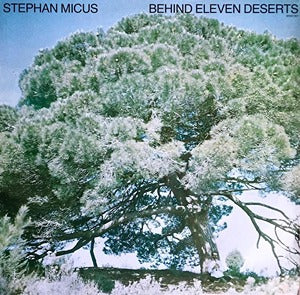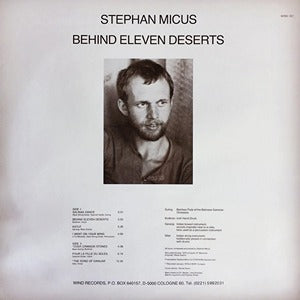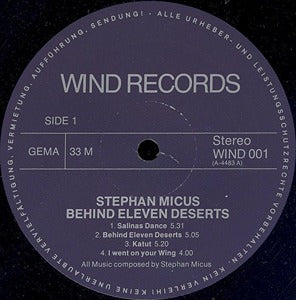Stephan Micus Behind Eleven Deserts LP Wind Near Mint
Stephan Micus Behind Eleven Deserts LP Wind Near Mint
Couldn't load pickup availability
Stephan Micus
Behind Eleven Deserts
Wind German press
1978
cover and vinyl in Near Mint condition
Micus has made two trips to Armenia to learn to play the duduk, the plaintive, oboe-like instrument which lends its melancholy tone to so much Armenian music. The first time he studied with Djivan Gasparyan, the second with Gevorg Dabaghyan, two musicians who are considered by many to be the greatest living masters. He’s used the duduk on two previous albums Towards the Wind (2002) and Snow (2008). Traditionally the bass duduk is only used as an accompanying drone, playing just one or two notes. But on the opening and closing tracks of White Night Micus uses it for soulful melodies that frame his story with themes of deep profundity. You’ve never heard a duduk go as low as this.The other solo in the centre of the album is ‘The Moon’, a duduk solo, played on a much smaller instrument than the standard one. The composition has nothing to do with traditional Armenian music, but certainly evokes the lonely, misty and ethereal shimmer of the moon in the night sky. For many of his CD booklets Micus chooses a small text to intensify the particular mood of each album. For White Night he’s chosen a Japanese poem, so the track ‘The Poet’ could represent the anonymous writer reciting his verse about the entrancing birdsong in the white, moonlit night.Other striking instruments we hear are Indian cane whistles multi-tracked many times, which in ‘Fireflies’ alternate with Micus’ own voice in chorus. “They are simple cane flutes which you play like a recorder. I bought them on the street somewhere costing a few cents each.” And there are the Tibetan cymbals which Micus bought in Ladakh. These are ritual temple instruments and their clashing rhythms bring a ceremonial quality to the opening and closing of this album. It’s a reminder that Stephan Micus’ music has a profundity, that connects to cultures all over the world and their musical expression. But as he says, “it makes no sense for me to play traditional Armenian duduk.” His desire is to take us on a journey, using rare and obscure instruments combined in a novel way, to reach out to our universal emotions.“Nowadays people in cities have lost contact with the moon,” says Micus. “I have lived all my life in the countryside and have had the privilege to experience many nights around the full moon. That’s why I dedicate this album to the moon which has always been a source of magic in many cultures. Music too is a source of magic which is where the two connect.”
Share






